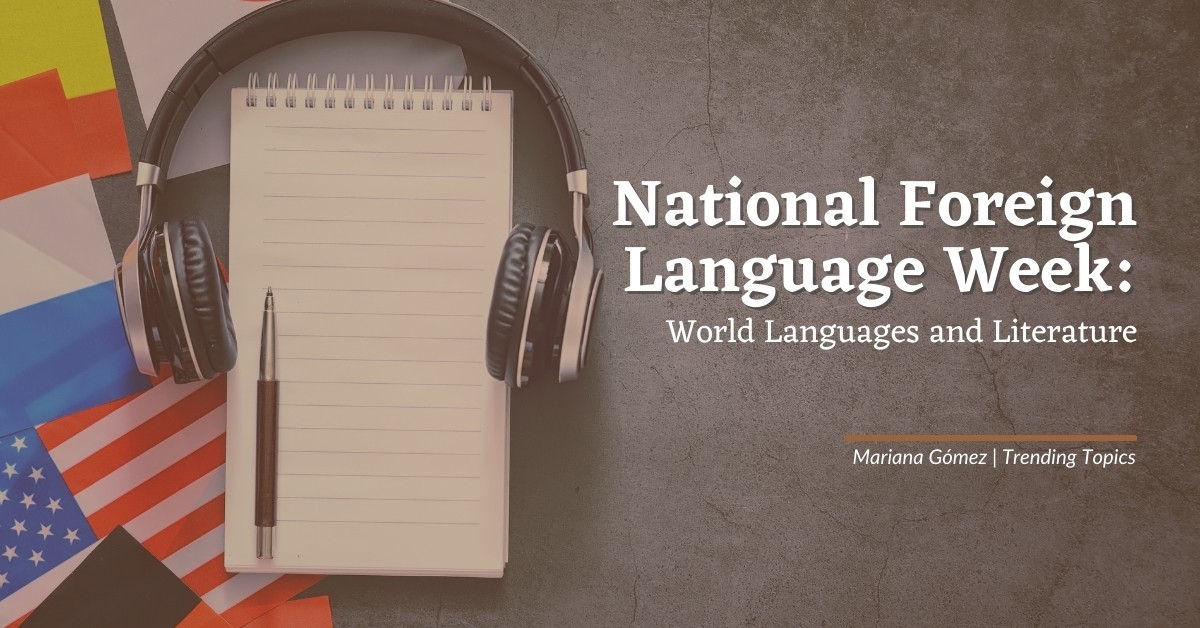
National Foreign Language Week: World Languages and Literature
This week we are celebrating National Foreign Language Week and we’d like to help you open your students’ eyes about the world languages and literature as a potential university major. Check it out!
Explore Majors in High School
Going to highschool is fun. Students make new friends, explore more difficult subjects, start going to parties, find first love, and so much more. What’s not exactly fun, however, is the prospect of choosing a university major in preparation for the big change. Too many options and universities may be the problem or simply the fact that it’s hard to choose from what you don’t yet fully understand. Here is where teachers like you step in as mentors and guide the students through the process of choosing a career!
World Languages Major

A lot of high school students think “boooring” when it comes to foreign languages, but the truth is that studying a major in this topic is actually interesting and fun. It allows you to understand the world better, identify commonalities, and respect cultural differences around the world.
The major of World Languages consists not only of learning the language itself, but also of forging a deeper connection and understanding of the culture it embodies. Some universities, such as Georgetown University, offer studies in history, literature, politics, and arts as well as the related foreign language in order to have a more complete education. Colleges and universities usually offer the following languages that you will want to explore during National Foreign Language Week:
- Arabic
- Chinese
- French
- German
- Greek
- Hebrew
- Hungarian
- Italian
- Japanese
- Korean
- Portuguese
- Russian
- Spanish
While the programs in every university somewhat vary, it’s just a matter of the student’s preference for what he or she wants to study.
Valuable Skills for the Workplace
At the same time, the skills students acquire with this major are increasingly useful in our interdependent world. Nowadays, globalization has become one of the most important topics around the world. If you don’t have the spark, such as the initiative to change things, to explore new horizons, get out of your comfort zone, adapt quickly to change, and don’t concern yourself with the world’s trends, problems, and advances, then you’ll definitely be left behind. Some of the skills you will develop with this major are:
Communication
- communicate assertively
- multilinguistic
- understand multiple viewpoints
- present information logically
- write effectively
With these skills, organizations will look at you more favorably than your competitors. A survey of 400 companies with 100,000 employees each reveals the cost of poor communication: it cites an average loss per company of USD $62.4 million per year because of miscommunication between employees (and managers). Imagine how necessary you would be in a multinational (and also smaller) company if you are capable of changing those statistics for the better.
Human relations
- Understand cultural differences
- flexibility in thinking and learning
- the ability to adjust to new environments
- appreciation of cultural history
These are skills that every company in the world looks for. According to Forbes, the teams that adapt to change are the most effective ones, and that only can happen with curious leaders that are willing to take risks and live with the consequences of their actions.
Critical thinking
- think collaboratively
- analyze information,
- compare and contrast interpretations
- offer diverse perspectives
- synthesize themes
These skills will definitely give you a competitive edge in the market. According to Forbes, critical thinking is crucial if we are to prepare students to be innovators of tomorrow. Companies are looking for people who can recognize, interpret, and raise vital questions for problems of this century.
Problem-solving
- the ability to define problems
- understand alternative perspectives
- weigh probable solutions
- generate creative solutions
These particular skills are a must-have in projects nowadays. In fact, Albert Einstein said that if he had one hour to save the world he would spend fifty-five minutes defining the problem and only five minutes finding the solution. This illustrates an important point: before jumping right into a problem, we should step back and invest time and effort to improve our understanding of it. If you have the ability to accomplish this, you’ll definitely be the MVP of the organization.

What careers can students opt for?
So, what jobs can students get with this kind of degree? Would they only be able to be translators? The answer to that is no. Actually, there are plenty of job opportunities in the market for people who study world languages and literature. As we saw before, the skills students get with this major are very important for companies. Here are some of the careers or industries that these graduates may choose from (along with the complement of other studies):
- Journalist/writer
- Television reporter
- Radio production
- Editorial assistant
- Web editor
- Attorney
- Artificial intelligence
- FBI/NSA agent
- International relations specialist
- Foreign service
- Human rights worker
- Financial analyst
- Human resources specialist
- Market research analyst
- Consultant
- Fashion industry
- International marketing
- Investment banking
- Professor/Teacher
- Electronic commerce
As you can see, there are many industries in which people who study this major can work. It’s amazing how the study of languages can open so many doors if you know how to take advantage of it.
Literature and Language Major
We’ve seen a little bit about world languages, but what about a major in literature? Is it THAT cool? How can someone actually study that?
A literature major involves reading and analyzing works of literature. It includes discussing texts and understanding their historical, cultural, and literary significance. And if you choose to explore this in university, you’ll spend a lot of time analyzing and explaining novels, poems, and short stories. What’s more, this major is reading and writing intensive, and it focuses on a language that enlightens, reflects culture, expresses feelings and experiences, and brings enjoyment.
How It Transfers to the Real World
People may question whether studying literature is transferable to the real world, and the fact is: it absolutely does. Literature majors graduate with strong skills in reading, writing, critical thinking, and assertive communication, which, as we saw before, are very powerful nowadays and can get you a huge list of jobs that can be very entertaining and professional.
English Literature
In fact, many people who majored in English literature have become highly successful in business, government, and technology. For example, the filmmaker Steven Spielberg majored in English literature at California State, the former Avon CEO Andrea Jung was an English literature major at Princeton University, the television host Conan O’Brien was a double history and English major at Harvard University, the former Disney CEO Michael Eisner was a double major in English and theatre at Denison University, and the first American woman in space, Sally Ride, got her English degree from Stanford. And just like them, there are many successful and famous people who studied literature in some way.
Average Income for Literature and Language-Related Careers
It’s fun to see all the “life opportunities” that these majors can give to students, but it’s even better to see the economic growth they can cause in their life. Salaries vary based on the career students pursue, but if they choose to chase something regarding journalism, marketing, or public relations, starting salaries are usually between $30,000 – $45,000 range.
If the students don’t want to follow these kinds of careers, there are plenty of other options.
Here are some examples of the best jobs for English majors:
- Corporate communications director: average salary of $128,000
- Advertising manager: average salary of $127,560
- Lawyer: average salary of $118,160
- Public relations manager: average salary of $107,320
- Editorial directors: average salary of $92,000
- Executive editors: average salary of $91,000
- Content strategists: average salary of $90,500
- Content marketing managers: average salary of $82,100
- Web producer: $69,900
- Technical writer: average salary of $69,700
- Writer and author: average salary of $61,240
- Teacher: $58,030
- Interpreter and translator: average salary of $46,120
Make an Impact With Your Lesson on Majors
The number of opportunities that these majors offer is amazing. It’s just a matter of making the most of them in order to generate an impact on our lives and in those of others. If you are a teacher, remember to always motivate your students to be better every day and to pursue what makes them happy. If they’re interested in literature or language, this is your way in!
Be sure to check out our blog post on 6 Reasons to Learn Spanish! Let your students know all the great advantages of learning Spanish.
Build World Languages With Spanish Lessons
We hope this was useful to you! If you are looking for more information about foreign language, culture, or simply want to learn more about Spanish, sign up for a free online Spanish class at Homeschool Spanish Academy. Hope to see you soon!

Would you like more titles from National Foreign Language Week? Check these out!
- What is National Foreign Language Week and How to Celebrate
- How to Get Your School Involved for NFLW
- Top Professional Careers for World Languages and Literature Graduates
- Hispanic Flags: Symbolism Vocabulary in Spanish
- 20 Inspirational Quotes in Spanish for Your Classroom During NFLW
- Celebrate Foreign Languages Through Film During NFLW
- How to Talk About Learning a Language in Spanish - October 31, 2024
- Top 10 Places to Visit in Guatemala City, Guatemala - June 6, 2024
- ‘How Much Is It?’ in Spanish: A Guide to Travel and Shopping - May 9, 2024




